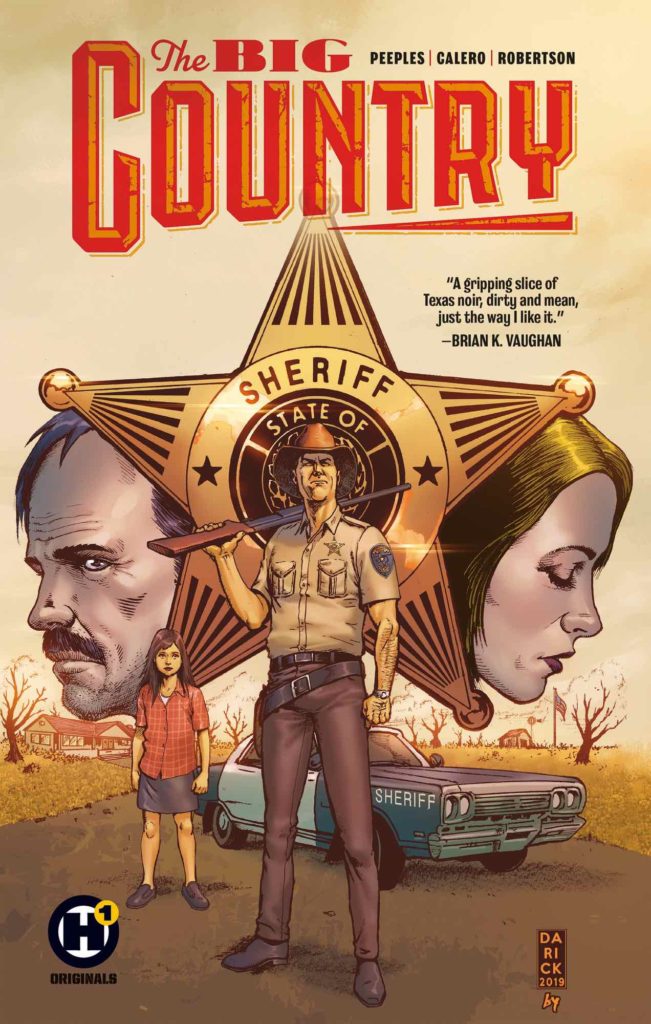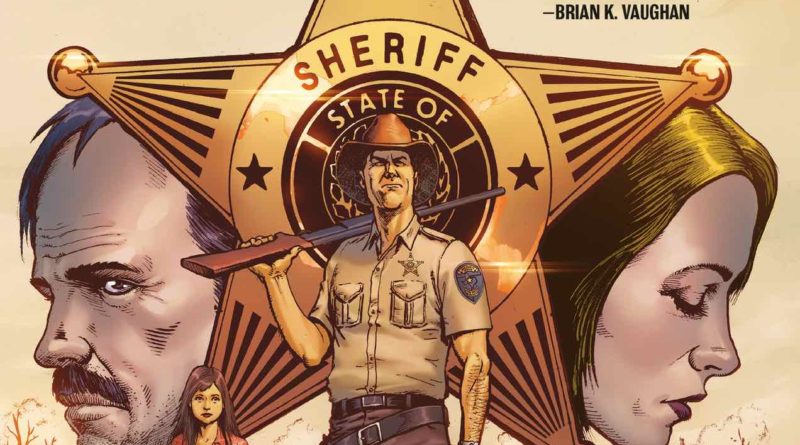INTERVIEW: Quinton Peeples jumps from TV to graphic novels with ‘Big Country’
Image courtesy of Humanoids / Provided by Superfan Promotions with permission.
The year: 1978. The setting: a small town in Texas. The protagonist: the last of a long line of sheriffs. The story: a serial killer on the loose.
The Big Country, the new graphic novel from Humanoids, comes from the mind of Quinton Peeples, a writer who has made a name for himself in the world of TV. His projects in recent years have included everything from Runaways to Iron Fist to The Last Ship. Now he has made the creative jump to graphic novels.
Peeples, according to press notes, has crafted a 128-page Texas noir with the help of artist Dennis Calero, colorist Lisa Lubera and lettering by Andworld Design. His main character is named Grissom Callahan (what a name!), a sheriff who learned everything from his father and grandfather, but the old ways don’t seem to be working in the new world.
Recently Hollywood Soapbox exchanged emails with Peeples about The Big Country and what Humanoids calls his themes of toxic masculinity and the cycle of violence. Questions and answers have been slightly edited for style.
What inspired you to create The Big Country?
After a long stretch of writing based on other material — 11/22/63, Marvel’s Runaways, I was ready to write in my own voice using the people and places I knew growing up. There was a mindset — a male approach to everyday violence that I thought would fit perfectly into a noir story, so all I needed was a crime and then off I went.
What do you think the graphic novel says about violence and society?
What is currently labeled as toxic masculinity was formerly just thought of as what it was ‘to be a man.’ And male currency was (and I think still is) determined by how well you can dish out and receive violence. It’s a marker of your manhood. While current American culture is focused on trying to get a handle on that idea, it’s very surface-oriented, at least in my opinion. A simplified view of ‘Just stop doing those things’ doesn’t get to the heart of the matter. This way of life is inherited and woven into the very fabric of male identity. That’s what the book is about — men who have no idea or remorse about the violent lives they lead or the damage they are doing. They think this is the way life is meant to be. That’s the tragedy of the book. Everyone suffers from this misguided idea.

Do you feel that this 1970s-set story offers commentary on 2019?
I hope so. That was the intent. The setting seems like a place outside of time. That’s what growing up there felt like — suspended animation. The people, places, even the music that surrounded me every day seemed to come from a time before. Like we had been left behind somehow. I liked that feeling for this story, and I think Dennis’ work supports that atmosphere.
What was it like to work with artist Dennis Calero?
The editors at Humanoids put us together. I was familiar with his previous work and was excited to see what he would do. I don’t hover over the artist. I prefer to collaborate in a way that makes them excited to sit down at the drawing board every day, so I try and give them the widest playing field possible. He would email me with questions occasionally, but other than that, the visual look of the book is almost entirely his work.
What was going through your mind when you received your first physical copy of The Big Country? How exciting was it to hold your debut graphic novel?
Libraries and bookstores have changed my life. I’m the person who has literally picked a random book off the shelf and had their life transformed. The idea that this book might do that for someone else thrills me to no end. I like the idea that a copy might end up in a cardboard box at a garage sale and someone buy it for a dollar and then be carried away by the story. The long life of a printed book with my name on it is just the greatest thing ever.
By John Soltes / Publisher / John@HollywoodSoapbox.com
The Big Country by Quinton Peeples is now available from Humanoids. Click here for more information.

